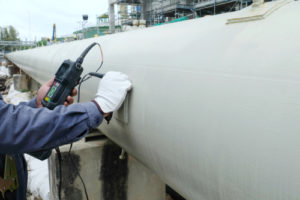
U.S. Rep. Sam Graves (R-MO) joined U.S. Sens. Roger Wicker (R-MS) and Deb Fischer (R-NE) in expressing their ongoing concerns about proper steps being taken by the Pipeline and Hazardous Materials Safety Administration (PHMSA) to regulate pipeline safety across the United States.
Specifically, the lawmakers are concerned about PHMSA’s implementation of the Protecting Our Infrastructure of Pipelines and Enhancing Safety Act of 2020, also known as the PIPES Act, a law tasking the PHMSA with promulgating regulations addressing a variety of pipeline safety issues.
“Given this administration’s anti-pipeline policies and messaging, it is imperative that we ensure PHMSA implements the PIPES Act in an unbiased manner that focuses on pipeline safety as Congress intended,” wrote the lawmakers and another GOP colleague in an Aug. 1 letter sent to PHMSA Acting Administrator Tristan Brown. “There are several provisions included in the PIPES Act that are critical to advancing pipeline safety, yet questions remain about their implementation status.”
For example, the lawmakers pointed to delays in a requirement for PHMSA to consider modernizing class location change requirements, which could create efficiencies for pipeline operators while further protecting the environment; as well as a failure to act on a requirement to issue regulations by the end of 2022 to create a new idled pipeline operating status that would provide operational efficiencies for pipelines temporarily not in service.
They also noted a lack of action by PHMSA on a requirement to update operations and maintenance standards for liquified natural gas facilities, among several other items, according to their letter.
Rep. Graves and Sens. Wicker and Fischer, and their colleague also questioned Brown about continued staffing challenges at PHMSA. They wrote that Section 102 of the PIPES Act provided PHMSA with additional authority to hire personnel with expertise in pipeline safety, pipeline facilities and pipeline systems to complete outstanding congressional mandates and rulemakings.
“Unfortunately, PHMSA has indicated that it will be hiring attorneys, environmental economists and climate change and mitigation staff, rather than personnel with pipeline safety expertise,” they wrote. “We are also disappointed that the president has not put forward a nominee for PHMSA administrator to provide permanent leadership.
“These unfulfilled staffing priorities cause us great concern that this administration is putting climate change messaging ahead of PHMSA’s pipeline safety activities,” the lawmakers wrote.
As members of the U.S. House Transportation and Infrastructure Committee and the U.S. Senate Commerce, Science, and Transportation Committee, which hold primary jurisdiction on pipeline safety at the U.S. Department of Transportation, the lawmakers requested that Brown “prioritize these critical rulemakings and actions and keep the committees regularly updated on their implementation.”



